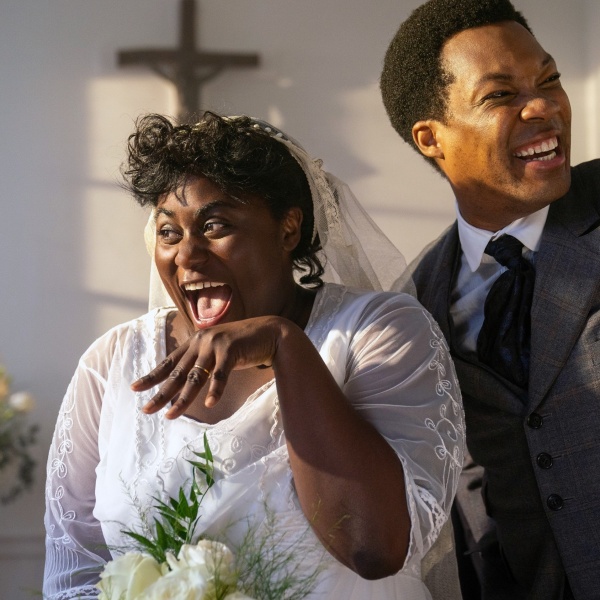
After its predecessor “Killshot” got a cursory limited release before being scuttled off to DVD and the film before that, “Proof,” hobbled in and out of theaters, “The Debt” is director John Madden’s first film in more than a decade to receive a theatrical run of more than 1600 screens, but an overbearing sense of self-importance undermines its box office potential, much less the effectiveness of skillful performances by a mostly-talented cast. Helen Mirren and Jessica Chastain, sharing the screen as the same character as much as current and next generations of great actresses, sustain a frequently overwrought (and overlong) tale of Mossad agents dealing with the truth of their past and fiction of their futures, while Madden handles Nazi war-crime subject matter with a predictable degree of melodrama.
Rachel Singer (played at 30 by Chastain and 60 by Mirren) is a Mossad agent who teams up with two others, the suave, self-assured Stefan (Marton Csokas and then Tom Wilkinson) and the green, idealistic David (Sam Worthington and Ciaran Hinds), to capture a Nazi war criminal named Dieter Vogel (Jesper Christensen) who’s hiding out as a gynecologist. Despite their preparation, the plan to kidnap him quickly falls apart, and they’re forced to bring him back to their hideout, where Vogel desperately attempts to convince them of his humanity. They are eventually forced to kill rather than convict Vogel, and spend the next 30 years recounting the story of their heroism in the face of this monstrosity. But after Rachel and Stefan’s daughter releases a book about the incident, they find out that some of the particulars of what happened may not be completely accurate, and are forced to decide whether to live with a lie or figure out a way to make it completely true.

With the release of “The Debt,” her third film in almost as many months, Jessica Chastain continues to prove that she is very much the real deal – even if her versatility and substance as a performer sometimes reflects the comparative phoniness of costars that aren’t equal to her talent. In “The Tree Of Life” she almost literally embodied Earth Mother, and in “The Help” she played a curvy, bubble-headed housewife. Here she vibrantly communicates both the strength and vulnerability of young Rachel, an agent well-trained in the ways of killing but sorely lacking in the experience of actually doing it. Like few actresses her age, she radiates a certain kind of thoughtfulness, a febrile kind of energy that makes the work she’s doing look effortless, while being absolutely riveting to watch. In fact, so good is her work in the flashback scenes that they feel like a full meal, and the “present day” story a secondary afterthought; unfortunately, that’s much to the film’s detriment as there’s plenty of sustenance in both time periods, prompting viewers to be a little overstuffed by the time the buffet is finished.
While we’re not sure either Hinds and Worthington or Wilkinson and Csokas are even vaguely similar enough looking to pull off the supposed transformations these characters go through, Wilkinson and Csokas have a good grasp on what’s shared between their interpretations of Stefan, and provide a satisfying degree of verisimilitude as they show his trajectory from charismatic company man to its eventual CEO. But Worthington’s baby-faced idealism feels sadly one-dimensional in the shadow of Hinds’ haunting version of David as an adult; while narratively the transition is natural, Hinds’ mere presence carries a gravitas that Worthington not only does not, but as an actor simply cannot possess. It certainly doesn’t help that Worthington’s accent is wildly uneven.
“The Debt” was adapted by Matthew Vaughn, Jane Goldman and Peter Straughan from a 2007 Israeli film of the same name, and to their credit they make a smart shift in the story’s focus from overdue retribution to personal revelation. But the time devoted to the flashback scenes is interesting and substantive enough that by the time we return to the present day to see the repercussions of those actions, we’re sort of ready for the story to wrap up. Instead, there’s another solid half-hour of storytelling that feels like a commercial concession rather than a creative necessity; while we won’t spoil too many plot details, the film switches from a spy thriller to a thoughtful portrait of self-examination and back to a thriller again, ultimately undermining the more searing emotional tones that the actors generated in those earlier scenes. That said, watching Helen Mirren as a sexuagenarian one-woman hit team is certainly worth a watch.
But when you’ve got a villain who’s literally a Nazi baby-killer, the work of vilifying him is done so instantaneously that any efforts to humanize him are largely ineffective – and moreover, the film gives its heroes such noble humanity, even in their failures, that he can only be less dimensional by comparison. In which case, “The Debt” is an effective thriller and character study in that it champions hard-won truth and condemns “evil” in both physical and metaphorical forms. But it aspires to tell a story that’s more complicated than it feels comfortable delivering, and as a result the audience may feel like they’re the ones paying the price rather than the characters. [C+]


